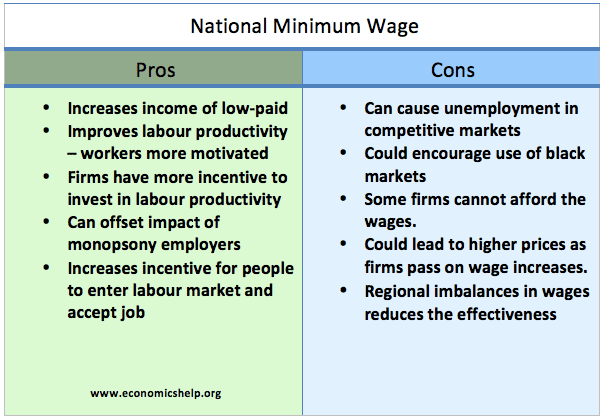The minimum wage for workers aged 16-18 is £4.55 (April 2020-21)
For workers, aged 18-20 is currently £6.45 (April 2020-21)
Readers Question: What are the minimum wage rates for 16, 17 and 18-year-olds. Should the minimum wage be increased? Should there be a minimum wage rate for children under 16?
Minimum Wage Rates from April 2020
- £8.72 – 25 and over
- £8.20 – Age 21-24
- £6.45 – Age 18-20
- £4.55 – Under 18
- £4.15 – Apprentice rate. (An apprentice means the firm has to devote a certain time to training the worker. Traditionally apprentices get lower pay to compensate the firms’ cost of training them.
Can 13, 14, and 15-year-olds get a minimum wage rate?
No, the minimum wage rate only applies to workers who are 16 and above.
The youngest age your child can work part-time is 13 years old, with the exception of children involved in: television, drama, film. [1. Child employment Direct gov]
Do young workers benefit from a national minimum wage?
Benefits of Min Wage
- A minimum wage is an effective tool for increasing wages of the lowest paid group of workers.
- Since the minimum wage has been introduced in 1997, unemployment has fallen, suggesting fears over real-wage unemployment have been misplaced.
- Minimum wages can increase labour productivity. Workers can feel more motivated with higher wages (efficiency wage theory). Also, if firms have to pay more, then they have an incentive to invest in workers and capital to increase labour productivity.
- In an era of low real wage growth, the minimum wage has played an increasing role in causing higher living standards.
Concerns over minimum wage
- An argument advanced is national minimum wage increases costs for firms and this can discourage employment opportunities. If the minimum wage rate rises too fast, it could cause unemployment in the future.
- The gap between workers under 18 and over 25 means that firms have a cost incentive to substitute older workers for younger workers. In labour intensive industries (e.g. fast food) firms may prefer to give longer hours to the youngest workers because they are nearly 50% cheaper than mature workers.
- Blackmarket. Another issue is that a legal minimum may encourage firms to pay young workers in cash and avoid legal restrictions.
- Regional inequality of wages. A national minimum wage can cause unemployment in the northeast (where wages are low) but have little effect in London, where wages are higher.
Does a minimum Wage encourage Labour market Participation?
- In theory, increasing the minimum wage for 16-18 year old workers would increase the incentive to join the labour market because work will become more attractive compared to studying at school and not earning.
- However, the minimum wage for 16 and 17 year-olds is still relatively low. It is £4.20 for people under 18. Therefore, the benefit of working on the minimum wage may still seem insignificant compared to the benefits from studying and getting qualifications which will enable higher lifetime earnings.
- Also, many 16 and 17 year-olds probably live rent free therefore there is not the same economic necessity to go out and get a job.
- Personally, I think the effect of a minimum wage for 16-18 year olds is relatively insignificant, I can’t think of many students who would give up A-levels just so that they could go and work in McDonald’s for £4.20 an hour.
- What is most likely is that there will be an increase in the participation of young workers doing part-time jobs in addition to studying full time.
Case for Increasing the Minimum Wage Rate
- Unfair firms can pay a lower wage rate to young workers doing the same job as people over 21.
- Efficiency Wage Theory – the idea if you pay a higher wage, you will get greater motivation and labour productivity.
Problems of Increasing the Minimum Wage Rate for young workers
- Could lead to unemployment and fewer job opportunities. Many firms may be unwilling to employ workers if there is a significant increase in the minimum wage rate. This would particularly affect labour-intensive industries like hairdressers and cafes.
- Arguably young workers lack experience, and so firms need to spend time and money on training them. Therefore a lower minimum wage rate is justified to pay for the costs of on-the-job training.
How Does the UK compare to other countries?
The UK minimum wage compares well compared to other countries like the US, Spain and Portugal, but still lower than some EU countries. International minimum wage rates
More on


Were do u work and were in the country
McDonald’s pays 16 – 17 year olds £5.50 per hour
In the top table of wage rates you give the wage of u/18 as £4.55.
Further done in the body of text you twice mention it as £4.20.
Yes, it went up
you should take legal action in the case of why the hell you studied that
What a stupid system if the person is doing the same job ,that’s not worth getting out of bed for .